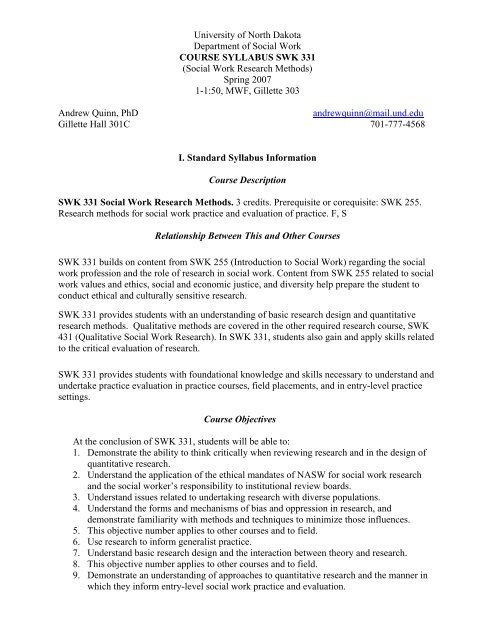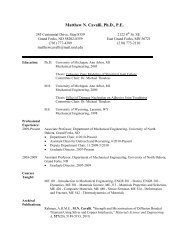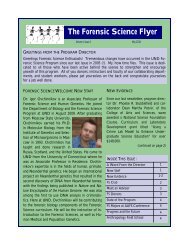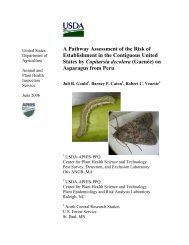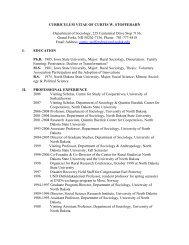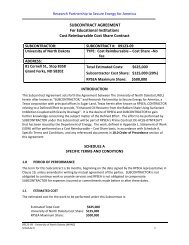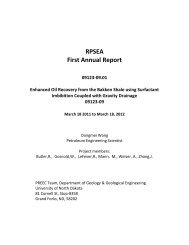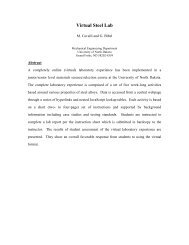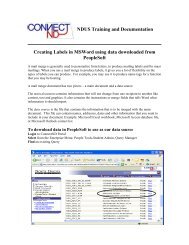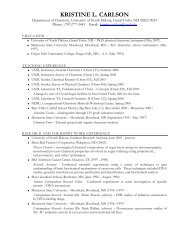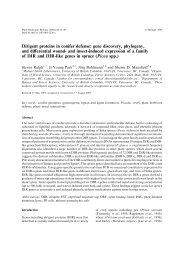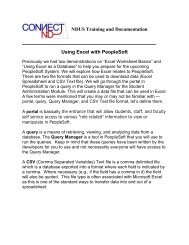SWK 331 - University of North Dakota
SWK 331 - University of North Dakota
SWK 331 - University of North Dakota
You also want an ePaper? Increase the reach of your titles
YUMPU automatically turns print PDFs into web optimized ePapers that Google loves.
<strong>University</strong> <strong>of</strong> <strong>North</strong> <strong>Dakota</strong><br />
Department <strong>of</strong> Social Work<br />
COURSE SYLLABUS <strong>SWK</strong> <strong>331</strong><br />
(Social Work Research Methods)<br />
Spring 2007<br />
1-1:50, MWF, Gillette 303<br />
Andrew Quinn, PhD<br />
andrewquinn@mail.und.edu<br />
Gillette Hall 301C 701-777-4568<br />
I. Standard Syllabus Information<br />
Course Description<br />
<strong>SWK</strong> <strong>331</strong> Social Work Research Methods. 3 credits. Prerequisite or corequisite: <strong>SWK</strong> 255.<br />
Research methods for social work practice and evaluation <strong>of</strong> practice. F, S<br />
Relationship Between This and Other Courses<br />
<strong>SWK</strong> <strong>331</strong> builds on content from <strong>SWK</strong> 255 (Introduction to Social Work) regarding the social<br />
work pr<strong>of</strong>ession and the role <strong>of</strong> research in social work. Content from <strong>SWK</strong> 255 related to social<br />
work values and ethics, social and economic justice, and diversity help prepare the student to<br />
conduct ethical and culturally sensitive research.<br />
<strong>SWK</strong> <strong>331</strong> provides students with an understanding <strong>of</strong> basic research design and quantitative<br />
research methods. Qualitative methods are covered in the other required research course, <strong>SWK</strong><br />
431 (Qualitative Social Work Research). In <strong>SWK</strong> <strong>331</strong>, students also gain and apply skills related<br />
to the critical evaluation <strong>of</strong> research.<br />
<strong>SWK</strong> <strong>331</strong> provides students with foundational knowledge and skills necessary to understand and<br />
undertake practice evaluation in practice courses, field placements, and in entry-level practice<br />
settings.<br />
Course Objectives<br />
At the conclusion <strong>of</strong> <strong>SWK</strong> <strong>331</strong>, students will be able to:<br />
1. Demonstrate the ability to think critically when reviewing research and in the design <strong>of</strong><br />
quantitative research.<br />
2. Understand the application <strong>of</strong> the ethical mandates <strong>of</strong> NASW for social work research<br />
and the social worker’s responsibility to institutional review boards.<br />
3. Understand issues related to undertaking research with diverse populations.<br />
4. Understand the forms and mechanisms <strong>of</strong> bias and oppression in research, and<br />
demonstrate familiarity with methods and techniques to minimize those influences.<br />
5. This objective number applies to other courses and to field.<br />
6. Use research to inform generalist practice.<br />
7. Understand basic research design and the interaction between theory and research.<br />
8. This objective number applies to other courses and to field.<br />
9. Demonstrate an understanding <strong>of</strong> approaches to quantitative research and the manner in<br />
which they inform entry-level social work practice and evaluation.
10. Demonstrate an ability to use communication in a pr<strong>of</strong>essional manner to obtain and<br />
disseminate information throughout the research and evaluation process.<br />
11. This objective number applies to other classes and to field.<br />
12. This objective number applies to other classes and to field.<br />
Classroom Policies<br />
Important classroom policies are available in their entirety at web sites listed here.<br />
Class Attendance and Participation<br />
Students are expected to participate in all course learning opportunities.<br />
http://www.und.edu/dept/registrar/catalogs/catalog/ugdept/more.htm. Faculty will inform<br />
students <strong>of</strong> course expectations, including grading criteria, during the first week <strong>of</strong> class.<br />
Non-Discrimination<br />
There shall be no discrimination against persons because <strong>of</strong> race, religion, age, creed,<br />
color, sex, disability, sexual orientation, national origin, marital status, veteran's status or<br />
political belief or affiliation, and equal opportunity and access to facilities shall be available to<br />
all. http://sos.und.edu/csl<br />
Disability Statement<br />
If you have emergency medical information to share with me, if you need special<br />
arrangements in case the building must be evacuated, or if you need accommodations in this<br />
course because <strong>of</strong> a disability, please make an appointment with me. My <strong>of</strong>fice location is 301C<br />
Gillette Hall and hours are by appointment. If you plan to request disability accommodations,<br />
you are expected to register with the Disability Support Services (DSS) <strong>of</strong>fice (190 McCannel<br />
Hall, 777-3425 v/tty).<br />
http://www.und.edu/dept/dss/<br />
Grievance<br />
Student grievances are pursued through the College <strong>of</strong> Education and Human<br />
Development Grievance Procedure or http://www.und.edu/dept/csl/appendix-ii.htm<br />
Scholastic Dishonesty<br />
Students are expected to adhere to the NASW Code <strong>of</strong> Ethics and the Code <strong>of</strong> Student<br />
Life, including avoiding cheating, plagiarism, and collusion.<br />
http://www.und.edu/dept/csl/section-3.htm<br />
II. Course Outline<br />
Required Text<br />
Royce, D. (1999). Research methods in social work. Chicago: Nelson-Hall Publishers<br />
2
Supplemental Readings<br />
CITI Course in the protection <strong>of</strong> human research subjects. History and ethics. From the IRB<br />
training manual.<br />
Milgram, S. (1963). Behavioral study <strong>of</strong> obedience. Journal <strong>of</strong> abnormal and social psychology,<br />
67(4),371-378.<br />
Rubin, A., & Babbie, E. (2005). Research methods for social work (5 th ed.). Belmont, CA:<br />
Thompson Learning.<br />
Assignments for the Course<br />
Quizzes (20 points each): There will be four brief quizzes throughout the semester. Each quiz<br />
will be multiple choice. Quizzes will be open book and open notes. The lowest quiz grade will<br />
be dropped.<br />
Content summary areas (each worth 25 pts): For the majority <strong>of</strong> the content discussed in<br />
class, students will be required to turn in a 2-4 page summary <strong>of</strong> each <strong>of</strong> the major course content<br />
areas and provide examples using your topic. These summaries will be based on course lecture,<br />
textbook readings and supplemental text. These assignments are due when lecture begins and<br />
will not be accepted outside <strong>of</strong> class hours. The due dates <strong>of</strong> these assignments will be<br />
announced in class. The specific guidelines for the summaries will be announced in class and<br />
posted on Blackboard. However, for the most part, these summaries will need to address the<br />
three points mentioned below.<br />
General guidelines for the content summaries.<br />
1. a summary <strong>of</strong> the content area (10 points)<br />
2. an application <strong>of</strong> the content area to your topic (10 points)<br />
3. How your understanding <strong>of</strong> the content advances your understanding <strong>of</strong> the social work<br />
pr<strong>of</strong>ession (5 points)<br />
Content Areas:<br />
1. Ways <strong>of</strong> knowing<br />
2. Ethical Issues<br />
3. Understanding Variable/Levels <strong>of</strong> Measurement<br />
4. Choosing a topic/Writing a research question/Writing a hypothesis<br />
5. Measurements<br />
6. Different Designs (Single subject, Pre-experimental, experiment, Quasi, experimental)<br />
7. Sampling<br />
8. Culturally competent research<br />
9. Program Evaluation<br />
Group Work Assignments (total 132 points):<br />
1. Topic Choice Assignment (5 points): The group will need to turn in a paragraph that<br />
answers the following<br />
10. What is the broad topic your group wishes to study?<br />
11. What specific aspects <strong>of</strong> the topic does your group wish to study?<br />
12. Why is understanding those topics important to understanding the population at<br />
large?<br />
2. Literature Review Assignment (36 points): The group as a whole will need to identify 3<br />
articles that address their topic. The articles must be from peer review journals. For each<br />
3
article the group will turn in a 2 page paper addressing the following questions.<br />
a. Who are (is) the author(s)?<br />
b. What is the date <strong>of</strong> publication?<br />
c. What is the title <strong>of</strong> the article?<br />
d. Where was the article published?<br />
e. What is the purpose <strong>of</strong> the study?<br />
f. What variables did they look at?<br />
g. What were the major findings <strong>of</strong> the study?<br />
h. What were the limitations <strong>of</strong> the study?<br />
3. Literature Review Assignment Part 2 (10 points): The group will work together to turn in<br />
a 1-2 page paper that addresses the following:<br />
a. What was the most important thing you learned from conducting your literature<br />
search<br />
b. What did you find frustrating?<br />
c. How was searching for pr<strong>of</strong>essional literature different from going into a search<br />
engine such as google?<br />
d. Did you discover it was necessary to narrow down your research topic? How did<br />
you do this?<br />
e. Did you see any patterns or themes in the literature? What were they?<br />
4. Identify the variables (10 points)<br />
a. Identify the variables that the group wishes to investigate.<br />
b. Provide a nominal definition and an operational definition<br />
c. Identify the independent variable(s) and dependent variable<br />
5. Development <strong>of</strong> a research question and hypothesis (5 points)<br />
a. The group as a whole will need to develop a research question that addresses their<br />
chosen topic.<br />
b. The group will <strong>of</strong>fer a testable hypothesis. The group will need to identify the<br />
independent and dependent variables in the hypothesis.<br />
6. Data collection/Instrumentation (20 points): the group as a whole will need to identify a<br />
method <strong>of</strong> measurement that collects data so that the research hypothesis can be tested.<br />
In a one page paper the group will address:<br />
a. What is the concept that is to be measured<br />
b. What does the response set consist <strong>of</strong><br />
c. Create 10 questions to use in your measure<br />
d. Discuss how you will address issues <strong>of</strong> reliability and validity with your<br />
instrument<br />
7. Design choice assignment (20 points)<br />
a. For each design category (pre-experimental, experimental, quasi experimental and<br />
single subject) the group will choose one specific design. The group will describe<br />
how they will apply the designs to their topic. The group will write a paragraph<br />
for each design.<br />
8. Sampling assignment (16 points)<br />
a. For all types <strong>of</strong> non probability and probability sampling the group will provide<br />
an example <strong>of</strong> how subjects can be sampled using each type <strong>of</strong> nonprobability and<br />
probability sampling. The types <strong>of</strong> sampling are simple random sampling,<br />
systematic sampling, stratified sampling, cluster sampling, snowball sampling,<br />
availability sampling, purposive sampling, and quota sampling)<br />
9. Analysis (5 points)<br />
a. The group will pick a method <strong>of</strong> analysis in which to examine their topic. The<br />
group will turn in a paragraph that addresses how the analysis will be used and<br />
4
why this choice <strong>of</strong> analysis is appropriate for examining their research questions<br />
10. Relevance to pr<strong>of</strong>ession (5 points): The group will turn in a paragraph that addresses the<br />
relevance <strong>of</strong> their research to their pr<strong>of</strong>ession.<br />
Individual Assignment: Research Proposal (50 points): The students will be asked to turn in a<br />
research proposal at the end <strong>of</strong> the semester. This research proposal will be based on<br />
your group topic. The research proposal will be written in APA style and should be<br />
between 8-10 pages in length. The research proposal should follow the outline below:<br />
1. Introduction<br />
a. Description <strong>of</strong> problem<br />
b. Statement <strong>of</strong> research question and hypothesis<br />
c. Significance <strong>of</strong> problem and rationale for studying it<br />
2. Literature Review<br />
a. Identify relevant studies that address or fail to address your topic<br />
b. Theoretical and historical perspectives<br />
c. Identified gaps in literature<br />
d. Reiteration <strong>of</strong> purpose <strong>of</strong> study (restate your research question and hypothesis)<br />
3. Methodology (a paragraph should be used to address each area listed below)<br />
a. Identification and definition <strong>of</strong> independent and dependent variables<br />
b. Research design<br />
c. Data collection procedures<br />
d. Description <strong>of</strong> instrumentation<br />
i. Include your list <strong>of</strong> questions<br />
ii. Address how you plan to assure reliability and validity with your measure<br />
e. Sampling design<br />
f. Data Analysis<br />
4. Conclusions<br />
a. What do you hope to find<br />
b. What is the relevance <strong>of</strong> proving your hypothesis within your pr<strong>of</strong>ession<br />
5. References<br />
Class Participation (10 points): Using the clicker response system you will be asked to respond<br />
to questions about the content. The clickers will allow for me (and only me) to keep track <strong>of</strong><br />
who responds. By using the clickers, I will be able to gauge your understanding <strong>of</strong> the content.<br />
You must respond to a minimum <strong>of</strong> 80% <strong>of</strong> the questions over the course <strong>of</strong> the semester to<br />
receive full credit for class participation. If you respond to 60-79% <strong>of</strong> the questions you will<br />
receive 8 points, while 40-59% will receive 5 points, while 20-39% will receive 3 points and<br />
below 19% will receive no points.<br />
Final exam (100 points): A comprehensive final exam will be given on the day <strong>of</strong> the scheduled<br />
final. You must take the final.<br />
5
Course Grading/Evaluation<br />
Assignments<br />
Point<br />
value<br />
Quizzes (3 @ 20 points apiece) 60<br />
Content summary areas (9 @ 25 points 225<br />
apiece)<br />
Group work 132<br />
Research Proposal 50<br />
Class Participation 10<br />
Final Exam 100<br />
Total 577<br />
Percentage<br />
Letter Grade<br />
90-100 A<br />
80-89 B<br />
70-79 C<br />
60-69 D<br />
59 or below F<br />
III. Course Schedule<br />
Course Schedule: The course schedule is subject to change with notice.<br />
Date: Content Readings Due dates<br />
1/10 Introduction/What is Royse Chapter 1<br />
this course is about/<br />
Assigning groups<br />
1/12 Ways <strong>of</strong> Knowing Lecture notes<br />
1/15 No class<br />
1/17 Ways <strong>of</strong> Knowing Lecture notes Identify a group topic/<br />
1/19 Ethical Concerns in<br />
research<br />
1/22 Ethical Concerns in<br />
research<br />
1/24 Ethical Concerns in<br />
research<br />
1/26 The way research<br />
proceeds/choosing a<br />
topic<br />
1/29 The way research<br />
proceeds/choosing a<br />
topic<br />
Chapter 3/Handout:<br />
NASW code <strong>of</strong> ethics<br />
5.02 research and<br />
evaluation/handout<br />
from IRB training on<br />
ethical issues<br />
Chapter 3/Handout:<br />
NASW code <strong>of</strong> ethics<br />
5.02 research and<br />
evaluation/handout<br />
from IRB training on<br />
ethical issues<br />
Chapter 3/Handout:<br />
NASW code <strong>of</strong> ethics<br />
5.02 research and<br />
evaluation/handout<br />
from IRB training on<br />
ethical issues<br />
Chapter 2<br />
Chapter 2<br />
Topic choice assignment<br />
due<br />
Content summary #1<br />
6
1/31 Guest Lecturer: Victor Chapter 2 Content summary 2<br />
Lieberman<br />
2/2 Developing a literature Chapter 2<br />
Review<br />
2/5 Developing a literature<br />
review<br />
2/7 No class (use the time<br />
to work on the<br />
literature review<br />
assignments)<br />
2/9 Variables Chapter 2 , p.281-286 Literature Review<br />
Assignment Part 1 and 2<br />
Due<br />
2/12 Variables Chapter 2 , p.281-286<br />
2/14 Variables/ Quiz 1 Chapter 2 , p.281-286 Identify the variables<br />
2/16 Developing a research<br />
question and hypothesis<br />
2/19 No class<br />
2/21 Developing a research<br />
question and hypothesis<br />
2/23 Developing a research<br />
question and hypothesis<br />
Chapter 2, lecture<br />
notes<br />
Chapter 2, lecture<br />
notes<br />
Chapter 2, lecture<br />
notes<br />
Development <strong>of</strong> a<br />
research question and<br />
hypothesis<br />
2/26 Measurement Chapter 6,7,8<br />
2/28 Measurement Chapter 6,7,8<br />
3/2 Measurement Chapter 6,7,8 Content summary 3<br />
3/5 Measurement Chapter 6,7,8<br />
3/7 Measurement Chapter 6,7,8 Data<br />
collection/Instrumentation<br />
3/9 Quiz 2 Content summary 4<br />
3/12 No class<br />
3/14 No class<br />
3/16 No class<br />
3/19 Types <strong>of</strong> Design Chapter 4,5<br />
3/21 Types <strong>of</strong> Design Chapter 4<br />
3/23 Types <strong>of</strong> Design Chapter 4<br />
3/26 Types <strong>of</strong> design Chapter 4 Content summary<br />
5/Design choice<br />
3/28 Threats to validity Chapter 4<br />
3/30 Threats to validity Chapter 4<br />
4/2 Sampling Chapter 8 pgs 189-<br />
198<br />
4/4 Sampling Chapter 8 pgs 189-<br />
198<br />
4/6 No class<br />
4/9 No class<br />
4/11 Sampling Chapter 8 pgs 189-<br />
198<br />
4/13 Sampling Chapter 8 pgs 189-<br />
198<br />
Content summary 6<br />
Sampling assignment<br />
4/16 Quiz 3<br />
4/18 Collecting Data Lecture Notes<br />
4/20 Collecting Data Lecture Notes Content summary 7<br />
4/23 Data Analysis Chapter 12<br />
4/25 Data Analysis Chapter 12 Analysis/relevance<br />
4/27 Culturally Competent<br />
research<br />
Lecture Notes<br />
7
4/30 Program Evaluation Chapter 11<br />
5/2 Quiz 4 Content Summary 8<br />
5/4 Review for the final Content summary #9/<br />
Individual research<br />
proposal<br />
Finals<br />
IV. Course Objectives, Tasks to Meet Objectives, and Method <strong>of</strong> Measurement<br />
Course Objectives Tasks to Meet Objectives Method <strong>of</strong> Measurement<br />
1. Demonstrate the ability to<br />
think critically when<br />
reviewing research and in<br />
the design <strong>of</strong> quantitative<br />
research.<br />
2. Understand the<br />
application <strong>of</strong> the ethical<br />
mandates <strong>of</strong> NASW for<br />
social work research and<br />
the social worker’s<br />
responsibility to<br />
institutional review<br />
boards.<br />
• Quiz/final questions that<br />
focus on the ability to think<br />
critically about choosing<br />
methods such as sampling,<br />
research design, writing<br />
survey questions, and<br />
hypotheses<br />
• Clicker Response questions<br />
that focus on reviewing the<br />
parts <strong>of</strong> a research design<br />
• Work in groups to discuss<br />
parts <strong>of</strong> the research proposal<br />
• In class exercises on the<br />
different topics such as<br />
critiquing research questions,<br />
sampling designs, and<br />
choices <strong>of</strong> group designs,<br />
single subject designs<br />
• In class exercises where<br />
students need to identify<br />
types <strong>of</strong> sampling, designs,<br />
threats to internal validity<br />
• Final exam is cumulative<br />
covering the range <strong>of</strong> topics<br />
discuss in class<br />
• Content area summaries<br />
covering the range <strong>of</strong> topics<br />
discussed in class (see<br />
content area assignment<br />
above)<br />
• Royse Chapter 2 (The way<br />
research proceeds) With<br />
specific attention to the way<br />
research proceeds<br />
• Content area summary on<br />
ethical research<br />
• Lecture on ethical<br />
considerations<br />
• Quiz/final questions on ethics<br />
• Work in groups to discuss the<br />
ethics <strong>of</strong> certain research<br />
scenarios (Milgram study,<br />
Zimbardo Study, the<br />
restaurant letter study, the<br />
Tuskegee Study)<br />
• Royse chapter 3 (Ethical<br />
Thinking and Research)<br />
• Grading <strong>of</strong> quizzes<br />
• Class participation credit<br />
• Instructor feedback<br />
• Final exam score<br />
• Content area grade<br />
• Content area grade<br />
• Quiz grade<br />
• Final exam<br />
• Clicker questions<br />
• Research proposal<br />
assignment<br />
8
3. Understand issues related<br />
to undertaking research<br />
with diverse populations.<br />
4. Understand the forms and<br />
mechanisms <strong>of</strong> bias and<br />
oppression in research,<br />
and demonstrate<br />
familiarity with methods<br />
and techniques to<br />
minimize those<br />
influences.<br />
5. This objective applies to<br />
other classes and field.<br />
6. Use research to inform<br />
generalist practice<br />
• Content area summary on<br />
ethics<br />
• Content area summary on<br />
culturally competent research<br />
• Lecture on culturally<br />
competent research (focus on<br />
culturally specific language,<br />
consider population when<br />
collecting data)<br />
• Work in groups to develop<br />
research proposal outlines that<br />
focus on diverse populations<br />
• Quiz/final questions about<br />
ethics and the representation <strong>of</strong><br />
diverse populations in research<br />
• Royse Chapter 6<br />
(Understanding and using<br />
research instruments), Chapter<br />
7 (Developing data collection<br />
instruments: Scales and<br />
Questionnaires), Chapter 8<br />
(Survey Research)<br />
• Content area summary on<br />
designs<br />
• Lecture on social justice<br />
• Readings on the Tuskeegee<br />
Syphilis study from IRB<br />
training on ethical issues<br />
• Readings on death <strong>of</strong> a normal<br />
volunteer from IRB training on<br />
ethical issues<br />
• Longres and Scanlon<br />
article“Social Justice and the<br />
Research Curriculum”<br />
• Content area summary on<br />
ethics<br />
• Content area summary on<br />
culturally competent research<br />
• Topic proposal part 3<br />
(identifying research articles<br />
that relate to diverse<br />
populations and how those<br />
populations were represented)<br />
• Work in groups to develop<br />
research proposal outline<br />
where social and economic<br />
justice is reflected while<br />
working with different<br />
populations.<br />
• Lecture on informing practice<br />
• Lecture on evidence based<br />
practice<br />
• Lecture on how research<br />
proceeds<br />
• Content area grade<br />
• Quiz grade<br />
• Final exam<br />
• Clicker questions<br />
• Research proposal grade<br />
• Content area grade<br />
• Quiz grades<br />
• Final exam<br />
• Clicker questions<br />
• Research proposal grade<br />
Quiz grades<br />
Content area grade<br />
Final exam<br />
Clicker questions<br />
Research proposal grade<br />
9
7. Understand basic research<br />
design and the interaction<br />
between theory and<br />
research.<br />
8. This objective number<br />
applies to other classes<br />
and to field.<br />
9. Demonstrate an<br />
understanding <strong>of</strong><br />
approaches to quantitative<br />
research and the manner<br />
in which they inform<br />
entry level social work<br />
practice and evaluation.<br />
10. Demonstrate an ability to<br />
use communication in a<br />
pr<strong>of</strong>essional manner to<br />
obtain and disseminate<br />
information throughout<br />
the research and<br />
evaluation process.<br />
11. This objective number<br />
applies to other classes<br />
and to field.<br />
12. This objective applies to<br />
other classes and to field.<br />
• Work in groups to discuss how<br />
research proposal is applicable<br />
to social work practice<br />
• Royse Chapter 3 (Ethical<br />
Thinking and Research)<br />
• Research proposal summary<br />
on conclusions for social work<br />
pr<strong>of</strong>ession/practice<br />
• Lecture on the role theory<br />
plays in research<br />
• Content area summary on way<br />
research proceeds<br />
• Royse Chapter 1<br />
(Introduction) Chapter 2 (The<br />
way research proceeds)<br />
• Permeates all lectures<br />
• Lectures on design,<br />
measurement, evaluation<br />
• Royse Chapter 1<br />
(introduction), Chapter 2 (the<br />
way research proceeds),<br />
Chapter 4 (Single Systems<br />
Design), Chapter 5 (Research<br />
Design for Group<br />
comparison), Chapter 6<br />
(Understanding and using<br />
research instruments), Chapter<br />
8 (Survey Research), Chapter<br />
12 (Data Analysis)<br />
• Research proposal assignment<br />
• Work in groups to discuss parts<br />
<strong>of</strong> the research proposal<br />
• Content area summaries<br />
• Royse Chapter 2 (the way<br />
research proceed), Chapter 13<br />
(Pr<strong>of</strong>essional Writing:<br />
Proposals, Research Reports,<br />
and Journal Articles.<br />
Quiz grade<br />
Content area grade<br />
Final exam<br />
Clicker questions<br />
Content area summary grades<br />
Quiz grade<br />
Final exam<br />
Clicker question<br />
Research proposal assignment<br />
Content area grades<br />
Class participation grades<br />
Research proposal grade<br />
V. Bibliography<br />
Altschuld, J. W., & Witkin, B. R. (2000). From needs assessment to action: Transforming needs<br />
into solution strategies. Thousand Oaks, CA: Sage.<br />
Cherry, A. L. (2000). A research primer for the helping pr<strong>of</strong>essions: Methods, statistics, and<br />
writing. Pacific Grove, CA: Brooks/Cole.<br />
10
Creswell, J. W. (1994). Research design: qualitative and quantitative approaches. Thousand<br />
Oaks, CA: Sage.<br />
Davis, S. (2003). Statistics anxiety among female African American graduate level social work<br />
students. Journal <strong>of</strong> Teaching in Social Work, 23(3/4), 143-158.<br />
De Anda, D. (2006). Baby think it over: Evaluation <strong>of</strong> an infant simulation intervention for<br />
adolescent pregnancy prevention. Health and Social Work, 31 (1), 26-35.<br />
Dunn, C. M., & Chadwick, G. (1999). Protecting study volunteers in research: A manual for<br />
investigative sites. Boston, MA: CenterWatch.<br />
Geever, J. C., & McNeill, P. (1997). The foundation center’s guide to proposal writing. The<br />
Foundation Center.<br />
Henerson, M. E., Morris, L. L., & Fitz-Gibbon, C. T. (1987). How to measure attitudes.<br />
Thousand Oaks, CA: Sage.<br />
Longres, J. F. & Scanlon, E. (2001). Social justice and the research curriculum. Journal <strong>of</strong> Social<br />
Work Education, 37(3), 447-463.<br />
Milgram, S. (1963). Behavioral study <strong>of</strong> obedience. Journal <strong>of</strong> abnormal and social psychology,<br />
67(4),371-378.<br />
Mohr, L. B. (1988). Impact analysis for program evaluation. Chicago, IL: Dorsey Press.<br />
Nixon, C. T., & <strong>North</strong>rup, D. A. (Eds.). (1997). Evaluating mental health services: How do<br />
programs for children “work” in the real world? Thousand Oaks, CA: Sage.<br />
Nugent, W. R., Sieppert, J. D., & Hudson, W. W. (2001). Practice evaluation for the 21 st<br />
century. Pacific Grove, CA: Brooks/Cole.<br />
Patton, M. Q. (1997). Utilization-focused evaluation. Thousand Oaks, CA: Sage.<br />
Peterson, R. A. (2000). Constructing effective questionnaires. Thousand Oaks, CA: Sage.<br />
Rodwell, M. K. (1998). Social work constructivist research. New York: Garland.<br />
Rubin, A., & Babbie, E. (2005). Research methods for social work (5 th ed.). Belmont, CA:<br />
Thompson Learning.<br />
Salahu-Din, S. (2003). Social work research: An applied approach. Boston, MA: Allyn and<br />
Bacon.<br />
Sapsford, R. (1999). Survey research. Thousand Oaks, CA: Sage.<br />
Scales, T., & Streeter, C. (Eds.). (2004). Rural social work: Building and sustaining community<br />
assets. Pacific Grove, California: Brooks/Cole.<br />
Shadish, W., Cook, T. & Campbell, D. (2002) Experimental & quasi-experimental designs for<br />
11
generalized causal inference. Boston: Houghton Mifflin.<br />
Soriano, F. I. (1995). Conducting needs assessments: A multidisciplinary approach. Thousand<br />
Oaks, CA: Sage.<br />
Weiss, C. H. (1998). Evaluation. Upper Saddle River, NJ: Prentice Hall.<br />
Welch, S., & Comer, J. (1988). Quantitative methods for public administration. Chicago, IL:<br />
Dorsey Press.<br />
York, R. O. (1997). Building basic competencies in social work research: An experiential<br />
approach. Boston, MA: Allyn and Bacon.<br />
York, R. O. (1998). Conducting social work research: An experiential approach. Boston, MA:<br />
Allyn and Bacon.<br />
12


